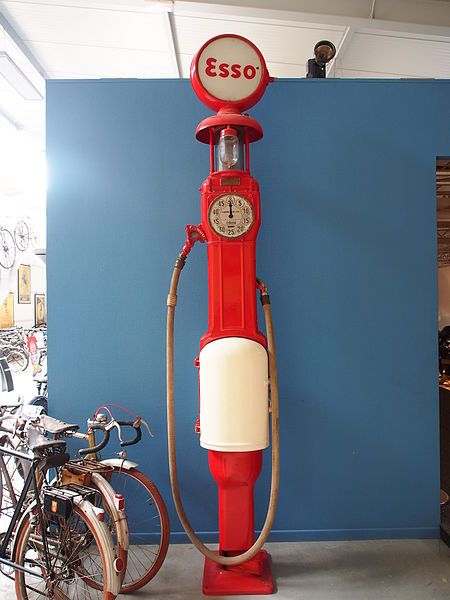Ex-basketball player
|
By John Updike
Pearl Avenue runs past the high-school lot, Bends with the trolley tracks, and stops, cut off Before it has a chance to go two blocks, At Colonel McComsky Plaza. Berth’s Garage Is on the corner facing west, and there, Most days, you'll find Flick Webb, who helps Berth out. Flick stands tall among the idiot pumps— Five on a side, the old bubble-head style, Their rubber elbows hanging loose and low. One’s nostrils are two S’s, and his eyes An E and O. And one is squat, without A head at all—more of a football type. Once Flick played for the high-school team, the Wizards. He was good: in fact, the best. In ’46 He bucketed three hundred ninety points, A county record still. The ball loved Flick. I saw him rack up thirty-eight or forty In one home game. His hands were like wild birds. He never learned a trade, he just sells gas, Checks oil, and changes flats. Once in a while, As a gag, he dribbles an inner tube, But most of us remember anyway. His hands are fine and nervous on the lug wrench. It makes no difference to the lug wrench, though. Off work, he hangs around Mae’s Luncheonette. Grease-gray and kind of oiled, he plays pinball, Smokes those thin cigars, nurses lemon phosphates. Flick seldom says a word to Mae, just nods Beyond her face toward bright applauding tiers Of Necco Wafers, Nibs, and Juju Beads. John Updike, “Ex-Basketball Player” from Collected Poems 1953-1993. Copyright © 1993 by John Updike. Reprinted with the permission of Alfred A. Knopf, a division of Random House, Inc. Source: Collected Poems 1953-1993 (Alfred A. Knopf, 1993) |
Questions
1. Show evidence that tells us how Flick spends his time.
2. Show evidence about Flick's past and how he feels about it.
3. In stanza 2, what words show how Updike personifies the gas pumps. What is the significance of this?
4. In line 16, still dealing with personification, the author states, "The ball loved Flick." Then in line 24, we are told that the lug wrench is indifferent to Flick. Explain why these details are important.
5. Look at the description of Pearl Avenue. Explain how the description could be a metaphor of his life.
1. Show evidence that tells us how Flick spends his time.
2. Show evidence about Flick's past and how he feels about it.
3. In stanza 2, what words show how Updike personifies the gas pumps. What is the significance of this?
4. In line 16, still dealing with personification, the author states, "The ball loved Flick." Then in line 24, we are told that the lug wrench is indifferent to Flick. Explain why these details are important.
5. Look at the description of Pearl Avenue. Explain how the description could be a metaphor of his life.
|
|
|
Questions
1. What is the theme of "Glory Days" by Bruce Springsteen? How is the theme similar to "Ex-Basketball Player"?
2. How do the title of the song and poem reflect what each are saying? Would the poem be different if it was entitled "Gas-Station Attendent" or "Flick Webb"?
3. How are the narrators of the poem and song different? How do each feel about the past?
4. Do you think there are lots of Flick Webbs in the world or those that fall back on the "Glory Days"? Explain.
1. What is the theme of "Glory Days" by Bruce Springsteen? How is the theme similar to "Ex-Basketball Player"?
2. How do the title of the song and poem reflect what each are saying? Would the poem be different if it was entitled "Gas-Station Attendent" or "Flick Webb"?
3. How are the narrators of the poem and song different? How do each feel about the past?
4. Do you think there are lots of Flick Webbs in the world or those that fall back on the "Glory Days"? Explain.
resources
Theme
The theme could be do something with you life or it could not to live in the past
Literary elements
Personification -- We see personification, giving human qualities to inanimate objects, in the line "the basketball loved Flick" and "the wrench was indifferent to Flick." They help us to understand that while Flick was a great basketball player he never learned a trade. He wasn't a mechanic and hasn't found anything fulfilling in life.
Flick also relives those days by dribbling an inner tube by the "idiot pumps" and think about what could have been. He describes the pumps in term of basketball players and calls them idiots because they are one-dimension like he was. He just played basketball and never studied.
Flick also relives those days by dribbling an inner tube by the "idiot pumps" and think about what could have been. He describes the pumps in term of basketball players and calls them idiots because they are one-dimension like he was. He just played basketball and never studied.
Imagery -- Imagery paints a picture and the picture the author paints in the first stanza is the progression of Flick's life. He went to school and then went only down the road to Berth's Garage. So figuratively and literally, Flick has never left school and basketball far behind. He has never gotten on with his life.
Point of View -- The point of view is the perspective that the story is told from. Here the perspective is from the author looking at Flick's life and how he could have been so much more if he learned a trade, but we can only trust the author. Maybe Flick was a simple man who enjoys life at Berth's Garage, joking with customers about his basketball days and playing pinball at Mae's. Does he have a family? A wife? Kids? Friends? We don't know.
Conflict -- Conflict is a clash between people, nature, or one's self and we see a couple possible conflicts in the poem. The first concerns Flick and his happiness. Is he conflicted because he never learned a trade and works at Berth's Garage. He had potential to go on, maybe to college, or learn a trade, but literally has not made it much further than school. Flick stands by the one-dimensional "idiots pumps" and dribbles an inner tube.
The second conflict may be that of the narrator. The narrator claims that Flick has wasted his life. Has he? Where is the evidence that he is unhappy? This may be just the narrators claim. "He never learn a trade; he just sells gas, changes oil, and changes flats." Is this Flick's disappointment or the narrator's disappointment in Flick?
The second conflict may be that of the narrator. The narrator claims that Flick has wasted his life. Has he? Where is the evidence that he is unhappy? This may be just the narrators claim. "He never learn a trade; he just sells gas, changes oil, and changes flats." Is this Flick's disappointment or the narrator's disappointment in Flick?


